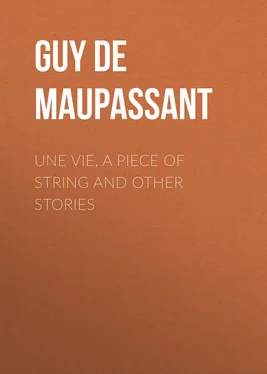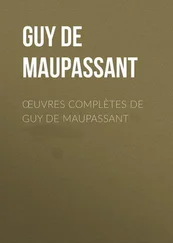Guy Maupassant - Une Vie, a Piece of String and Other Stories
Здесь есть возможность читать онлайн «Guy Maupassant - Une Vie, a Piece of String and Other Stories» — ознакомительный отрывок электронной книги совершенно бесплатно, а после прочтения отрывка купить полную версию. В некоторых случаях можно слушать аудио, скачать через торрент в формате fb2 и присутствует краткое содержание. Жанр: literature_19, foreign_antique, foreign_prose, на английском языке. Описание произведения, (предисловие) а так же отзывы посетителей доступны на портале библиотеки ЛибКат.
- Название:Une Vie, a Piece of String and Other Stories
- Автор:
- Жанр:
- Год:неизвестен
- ISBN:нет данных
- Рейтинг книги:5 / 5. Голосов: 1
-
Избранное:Добавить в избранное
- Отзывы:
-
Ваша оценка:
- 100
- 1
- 2
- 3
- 4
- 5
Une Vie, a Piece of String and Other Stories: краткое содержание, описание и аннотация
Предлагаем к чтению аннотацию, описание, краткое содержание или предисловие (зависит от того, что написал сам автор книги «Une Vie, a Piece of String and Other Stories»). Если вы не нашли необходимую информацию о книге — напишите в комментариях, мы постараемся отыскать её.
Une Vie, a Piece of String and Other Stories — читать онлайн ознакомительный отрывок
Ниже представлен текст книги, разбитый по страницам. Система сохранения места последней прочитанной страницы, позволяет с удобством читать онлайн бесплатно книгу «Une Vie, a Piece of String and Other Stories», без необходимости каждый раз заново искать на чём Вы остановились. Поставьте закладку, и сможете в любой момент перейти на страницу, на которой закончили чтение.
Интервал:
Закладка:
He appeared besides to look upon art as a pastime, literature as an occupation useless at best, while he willingly relegated love to the performance of a function, and suspected the motives of the most meritorious actions.
Some say that this was the inborn basis of his personal psychology. I do not believe it. That he may have had a low estimate of humanity, that he may have mistrusted its disinterestedness, contested the quality of its virtue, is possible, even certain. But that he was not personally superior to his heroes I am unwilling to admit. And if I see in his attitude, as in his language, an evidence of his inveterate pessimism, I see in it also a method of protecting his secret thoughts from the curiosity of the vulgar.
Perhaps he overshot the mark. By dint of hearing morality, art and literature depreciated, and seeing him preoccupied with boating, and listening to his own accounts of love affairs which he did not always carry on in the highest class, many ended by seeing in him one of those terrible Normans who, all through his novels and stories, carouse and commit social crimes with such commanding assurance and such calm unmorality.
He was undoubtedly a Norman, and, according to those who knew him best, many of his traits of character show that atavism is not always an idle word…
To identify Maupassant with his characters is a gross error, but is not without precedent. We always like to trace the author in the hero of a romance, and to seek the actor beneath the disguise. No doubt, as Taine has said, "the works of an intelligence have not the intelligence alone for father and mother, but the whole personality of the man helps to produce them…"
That is why Maupassant himself says to us, "No, I have not the soul of a decadent, I cannot look within myself, and the effort I make to understand unknown souls is incessant, involuntary and dominant. It is not an effort; I experience a sort of overpowering sense of insight into all that surrounds me. I am impregnated with it, I yield to it, I submerge myself in these surrounding influences."
That is, properly speaking, the peculiarity of all great novelists.
Who experiences this insight, this influence more than Balzac, or Flaubert, in Madame Bovary? And so with Maupassant, who, pen in hand, is the character he describes, with his passions, his hatreds, his vices and his virtues. He so incorporates himself in him that the author disappears, and we ask ourselves in vain what his own opinion is of what he has just told us. He has none possibly, or if he has he does not tell it.
This agrees admirably with the theory of impassivity in literature, so much in vogue when Maupassant became known. But despite that theory he is, if one understands him, quite other than "A being without pity who contemplated suffering."
He has the deepest sympathy for the weak, for the victims of the deceptions of society, for the sufferings of the obscure. If the successful adventurer, Lesable, and the handsome Maze are the objects of his veiled irony, he maintains, or feels a sorrowful, though somewhat disdainful tenderness, for poor old Savon, the old copying clerk of the Ministry of Marine, who is the drudge of the office and whose colleagues laugh at him because his wife deceived him, sansespoir d'"heritage."
Why did Maupassant at the start win universal favor? It is because he had direct genius, the clear vision of a "primitive" (an artist of the pre-Renaissance). His materials were just those of a graduate who, having left college, has satisfied his curiosity. Grasping the simple and ingenious, but strong and appropriate tools that he himself has forged, he starts out in the forest of romance, and instead of being overcome by the enchantment of its mystery, he walks through it unfalteringly with a joyful step…
He was a minstrel. Offspring of a race, and not the inheritor of a formula, he narrated to his contemporaries, bewildered by the lyrical deformities of romanticism, stories of human beings, simple and logical, like those which formerly delighted our parents.
The French reader who wished to be amused was at once at home, on the same footing with him… More spontaneous than the first troubadours, he banished from his writings abstract and general types, "romanticized" life itself, and not myths, those eternal legends that stray through the highways of the world.
Study closely these minstrels in recent works; read M. Joseph Bédier's beautiful work, Les Fabliaux, and you will see how, in Maupassant's prose, ancestors, whom he doubtless never knew, are brought to life.
The Minstrel feels neither anger nor sympathy; he neither censures, nor moralizes; for the self-satisfied Middle Ages cannot conceive the possibility of a different world. Brief, quick, he despises aims and methods, his only object is to entertain his auditors. Amusing and witty, he cares only for laughter and ridicule…
But Maupassant's stories are singularly different in character. In the nineteenth century the Gallic intellect had long since foundered amid vileness and debauchery. In the provinces the ancient humor had disappeared; one chattered still about nothing, but without point, without wit; "trifling" was over, as they call it in Champagne. The nauseating pabulum of the newspapers and low political intrigue had withered the French intellect, that delicate, rare intellect, the last traces of which fade away in the Alsatian stories of Erckman-Chatrian, in the Provençal tales of Alphonse Daudet, in the novels of Emile Pouvillon. Maupassant is not one of them. He knows nothing about humor, for he never found it in Life…
His ambition was not to make one laugh; he writes for the pleasure of recalling, without bias, what, to him, seems a halfway and dangerous truth… In his pessimism, Maupassant despises the race, society, civilization and the world…
If Maupassant draws from anyone it is Schopenhauer and Herbert Spencer, of whom he often speaks, although one does not know if he studied them very deeply. In all his books, excepting, of course, in the case of lines from the great tragic poets, one finds only one credited reference, which in to Sir John Lubbock's work on ants, an extract from which is introduced into Yvette.
No one was less bookish than himself. He was a designer, and one of the greatest in literature. His heroes, little folk, artisans or rustics, bureaucrats or shopkeepers, prostitutes or rakes, he places them in faintly colored, but well-defined surroundings. And, immediately, the simplified landscape gives the keynote of the story.
In his descriptions he resists the temptation of asserting his personal view. He will not allow himself to see more of his landscape than his characters themselves see. He is also careful to avoid all refined terms and expressions, to introduce no element superior to the characters of his heroes.
He never makes inanimate nature intervene directly in human tribulations; she laughs at our joys and our sorrows… Once, only, in one of his works, the trees join in the universal mourning-the great, sad beeches weep in autumn for the soul, the little soul, of la petite Roque.
And yet Maupassant adores this nature, the one thing that moves him… But, in spite of this, he can control himself; the artist is aware of the danger to his narration should he indulge in the transports of a lover.
With an inborn perception, Maupassant at once seizes on the principal detail, the essential peculiarity that distinguishes a character and builds round it. He also, in the presentation of his character, assumes an authority that no writer, not even Balzac, ever equalled…
He traces what he sees with rapid strokes. His work is a vast collection of powerful sketches, synthetic draftings. Like all great artists, he was a simplifier; he knew how to "sacrifice" like the Egyptians and Greeks…
Читать дальшеИнтервал:
Закладка:
Похожие книги на «Une Vie, a Piece of String and Other Stories»
Представляем Вашему вниманию похожие книги на «Une Vie, a Piece of String and Other Stories» списком для выбора. Мы отобрали схожую по названию и смыслу литературу в надежде предоставить читателям больше вариантов отыскать новые, интересные, ещё непрочитанные произведения.
Обсуждение, отзывы о книге «Une Vie, a Piece of String and Other Stories» и просто собственные мнения читателей. Оставьте ваши комментарии, напишите, что Вы думаете о произведении, его смысле или главных героях. Укажите что конкретно понравилось, а что нет, и почему Вы так считаете.











